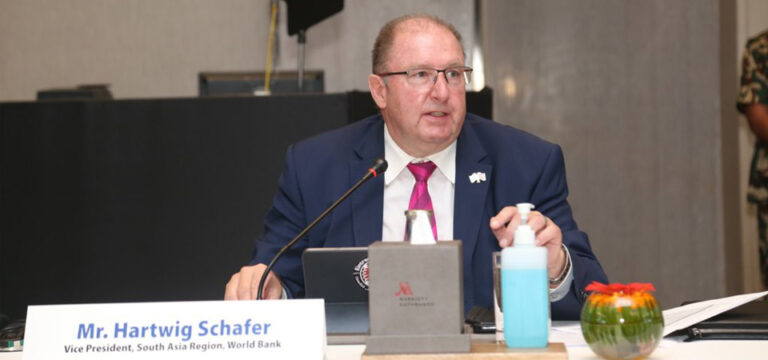
World Bank Vice President for South Asia, Hartwig Schafer, concluded his five-day visit to Nepal, reiterating the World Bank’s commitment to support Nepal’s resilient recovery from the pandemic.
In separate meetings with Prime Minister Sher Bahadur Deuba and Minister of Finance Janardan Sharma, Schafer commended the government’s effective COVID-19 response, including the swift rollout of vaccines and strong focus on economic recovery.
The meetings also stressed the importance of accelerating reform implementation and investment, and enhanced collaboration to support Nepal’s sustainable development, according to a press statement issued by the WB.
“Nepal is an example in resilience, emerging stronger from shocks such as the 2015 earthquake and working with a clear vision to build back better from the impacts of COVID-19,” said Schafer. “The World Bank is proud to be Nepal’s partner in development and is committed to work together with the government, development partners, private sector, civil society, and other key stakeholders for a recovery that is green, resilient, and inclusive.”
The World Bank joined the government of Nepal and development partners for the endorsement of the Kathmandu Declaration at a high-level roundtable on Green, Resilient, and Inclusive Development (GRID) on September 23.
The declaration underscored the government of Nepal’s commitment to the GRID vision and aligning partners’ support around potential priority investments, market incentives and policies, institutional actions, and information needed to support Nepal’s GRID transition.
“I applaud Nepal for embarking on a new development paradigm—the green, resilient and inclusive development framework or “GRID”. The GRID approach is meant to deliver short-, medium-, and long-term benefits to people, the planet, and Nepal’s economy,” said Schafer. “The WB is pleased to support the Kathmandu Declaration to strengthen Nepal’s sustainable development.”
Meetings were also held with Minister of Energy, Water Resources and Irrigation Pampha Bhusal, State Minister of Health Umesh Shrestha, government secretaries, development partners and representatives of the private sector.
Outside Kathmandu, Schafer visited the proposed Upper Arun Hydro Electric Project site and participated in an event on federalism with federal and local level authorities in Dhulikhel.
The World Bank is supporting feasibility studies and detailed design for the development of the proposed Upper Arun Hydropower project.
source : TRN,






